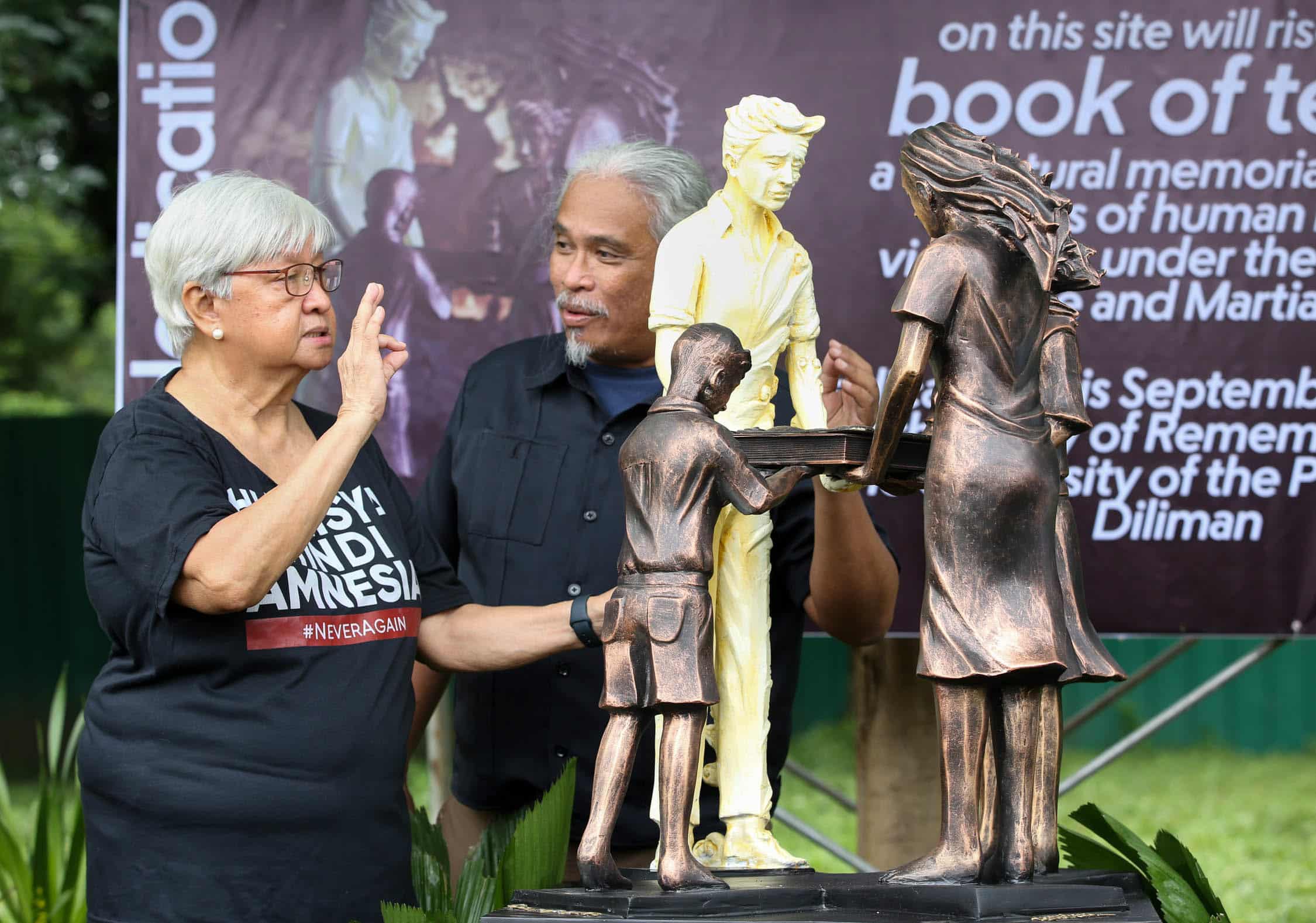
MONUMENT TO A STRUGGLE A small-scale model of the sculpture “Book of Tears,” shown here with its artist, Toym Imao, and former Social Welfare Secretary Judy Taguiwalo, is presented during a program at the University of the Philippines Diliman on Friday, ahead of today’s 52nd anniversary of the declaration of martial law. —LYN RILLON
MANILA, Philippines — A father who suddenly went missing. A mother with scars on her hands. A young girl whose dress was ripped. A boy killed as “collateral damage.”
Each figure, making up a nuclear family in a sculpture by acclaimed artist-activist Toym Imao, depicts various forms of abuse and injustice suffered by critics, dissenters and activists during the dictatorship of Ferdinand Marcos Sr.
READ: Remembering martial law: Hope, then despair
In Imao’s sculpture, they are gathered in a circle, as if to help each other carry the weight of a massive book.
These elements, Imao said, would be cast into a 7-foot-tall sculpture of aluminum and bronze.
Once finished, “Book of Tears” will be installed at the site of Freedom Memorial—a museum in honor of martial law victims and survivors—soon rising on the University of the Philippines (UP) campus in Diliman, Quezon City.
READ: Blame game over delayed martial law museum in UP
A smaller scale of Imao’s work-in-progress was shown at a gathering at UP Diliman on Friday, ahead of today’s 52nd anniversary commemoration of the declaration of martial law.
“It’s going to be one of the first efforts in the museum. So it’s going to be there already while the museum unfolds in the background,” Imao told the Inquirer.
‘An internarrative’
The artist said it would take him six to eight months to complete the sculpture and another month to mount it within the 1.4-hectare lot chosen for the museum.
“There are very subtle elements embedded within each and every representation about the victims during that period,” Imao said. “It’s going to be an internarrative about suffering and loss.”
The “father figure,” which is cast in white aluminum, represents cases of extrajudicial killings and enforced disappearances under the dictatorship.
The mother, though depicted as a “survivor,” went through her own horrors at the hands of her torturers, Imao explained.
Mijares and son
The figure of the boy was inspired by Boyet Mijares, the youngest son of the late journalist Primitivo Mijares, author of 1976 book “The Conjugal Dictatorship of Ferdinand and Imelda Marcos.”
After going into exile in the United States, the elder Mijares was never seen again after he was supposed to return to the Philippines with a known Marcos intelligence agent in 1977. Boyet, then age 15, was later found dead in Antipolo, his body bearing signs of torture.
11,103
“He’s collateral damage,” Imao said of the boy figure. “He represents the innocents that were also victims of human rights abuses during that period.”
The girl with torn clothes, meanwhile, symbolizes the youth activists who stood up and kept the anti-Marcos struggle burning.
“Book of Tears” will also bear inscriptions representing the 11,103 individuals who sought reparations and were recognized by the Human Rights Violations Victims’ Memorial Commission.
“But it also acknowledges the nameless individuals who may not have been included in the review or have applied for claims,” said Imao, who is also an assistant professor at UP College of Fine Arts.
Other gallery features of the Freedom Memorial Museum are a heat map of human rights violations; the roll of victims; a “wall of torture;” a sound installation by martial law survivor and playwright Bonifacio Ilagan; and a display of former UP Diliman chancellor Fidel Nemenzo’s blood-stained clothes when he was shot as a student during a 1984 protest at Welcome Rotonda.
Groundbreaking for the Freedom Memorial project is set for December this year.